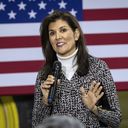"What do you want me to say about slavery?": Haley declines to say slavery caused Civil War

Former UN Ambassador Nikki Haley declined to say slavery was a cause of the U.S. Civil War during a town hall event in Berlin, New Hampshire, on Wednesday.
Why it matters: Haley, the former governor of South Carolina — the state in which the first shots of the war were fired — instead implied that the cause of the Civil War was the "government" infringing on individual rights.
Her response was similar to arguments put forward by proponents of the myth of the "Lost Cause," a pseudohistorical narrative that in part frames the Confederate cause as a heroic defense of states' rights while denying or excluding that slavery was at the heart of the crisis.
- The origin of the disunion between Northern and Southern states before and during the war was multifaceted and included economic and industrial modernization concerns, but reputable historians agree that the enslavement of Blacks and the expansion of states that permitted slaveholding were the root causes of the war.
What they're saying: After being asked by a person in the audience what she believes caused the war, Haley said: "I think the cause of the Civil War was basically how government was going to run, the freedoms and what people could and couldn't do."
- She then turned the question back onto the person, asking them what they believed caused the war.
- The person answered, " I'm not running for president. And I wanted to see what you think was the cause of the Civil War."
Haley then continued, saying, "I think it always comes down to the role of government and what the rights of the people are. And I will always stand by the fact that I think government was intended to secure the rights and the freedoms of the people."
- "It was never meant to be all things to all people. Government doesn't need to tell you how to live your life. They don't need to tell you what you can and can't do. They don't need to be a part of your life. They need to make sure you have freedom," she added.
- "We need to have capitalism. We need to have economic freedom. We need to make sure we need to do all things so that individuals have the liberties so they can have freedom of speech, freedom of religion, freedom to do or be anything they want to be without government getting in the way."
Of note: "What do you want me to say about slavery?" she responded to the person when they criticized her for not mentioning slavery in her answer. Haley abruptly moved on to the next question afterward, essentially declining to talk about slavery in a conversation about the Civil War.
- Shortly after the encounter at the town hall, President Joe Biden took to X with a four-word response: "It was about slavery."
In response to Axios' request for comment, Haley's campaign highlighted comments she made in an interview on Thursday morning.
- "Yes, we know the Civil War was about slavery. But more than that, what's the lesson in all this? That freedom matters. And individual rights and liberties matter for all people," she told The Pulse of New Hampshire.
- "That's the blessing of America. That was a stain on America when we had slavery. But what we want is never relive it. Never let anyone take those freedoms away again," she added.
The big picture: It was not the first time Haley omitted slavery when asked about the cause of the Civil War.
- She did so during an interview with a Southern activist group when she was running for governor of South Carolina in 2010, according to CNN.
- In that interview, Haley also defended states' rights to secede from the U.S. and described the Confederate flag not as an enduring symbol of racism but as part of heritage and tradition in South Carolina.
- After she became governor, Haley called on the state legislature to remove the Confederate flag from the state capitol following the anti-Black mass shooting at a Charleston church in 2015.
Go deeper: Haley, DeSantis neck-and-neck for second place in GOP primary: poll